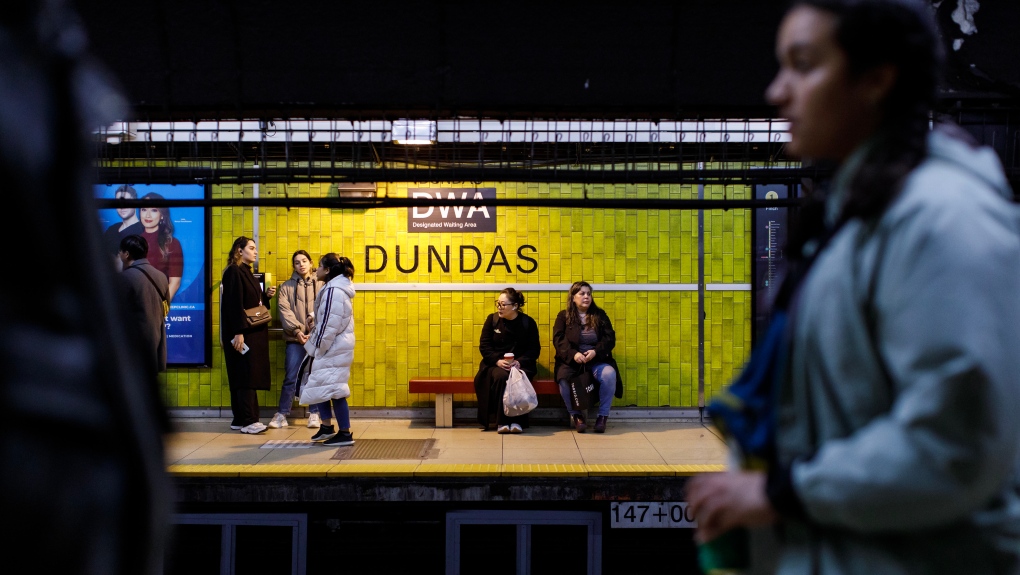Mitzie Hunter, Josh Matlow pitch Toronto transit safety plans
Two more Toronto mayoral candidates are pitching their plans to get safety on the TTC back on track following several high-profile incidents of violence on the network in the past year.
After submitting her nomination papers on Monday, Mitzie Hunter unveiled her five-point plan Wednesday which lists support for those struggling with mental health, addiction, and homelessness as a top priority.
- Download our app to get local alerts on your device
- Get the latest local updates right to your inbox
To that end, Hunter says she wants to pair transit officers up with social workers to “de-emphasize sole focus on enforcement by transit officers and emphasize public safety.”
“People will not return to using transit if they don’t feel safe and secure,” the Liberal MPP said in a news release. “We need people to feel safe and to actually be safe. My five-point TTC safety plan will achieve that.”
Beyond mental health supports, Hunter said she wants to install glass sliding doors on all subway platforms to act as a track-level barrier, after Toronto's busiest subway station, Bloor-Yonge, was the site of three attempted pushings in 2023.
Candidate Brad Bradford also called for barriers to be installed on subway platforms on Tuesday, starting with high-traffic stations like Bloor-Yonge, Eglinton, Finch, and St. George.
Both candidates face the same challenge with such a campaign promise: it’s expensive -- the TTC's latest estimates claim it could cost north of $1.35 billion.
However, Hunter said the cost is justified and that the barriers work in other modern transit systems like those in Tokyo, Copenhagen, and Dubai.
“We need to begin an affordable transition to this innovation, starting with the busiest stations,” Hunter said.
Bradford says the barrier is needed, but the current city councillor said he believes there could be cheaper, more affordable ways to install them.
"We really just need a barrier to prevent people from going onto the track," he said.
- WHO'S RUNNING?: 28 candidates sign up to run for Toronto mayor
Meanwhile, Josh Matlow touted his $115-million “Community Health and Safety Fund” as the answer to Toronto’s transit safety woes.
The fund, which he said addresses “the root causes of violent crime,” would be financed by “stabilizing” the Toronto Police Service’s annual $1.16-billion budget for three years.
“For too long, we’ve expected police to do too much…Let’s allow them to focus on solving crimes while properly resourcing community experts who can prevent violent incidents before they happen,” the longtime city councillor said Wednesday.
Like Hunter’s plan, Matlow said his platform would deliver expanded mental health supports by way of transit crisis teams specializing in de-escalation as well as additional and improved shelter access.
 Toronto mayoral candidates Mitzie Hunter (left) and Josh Matlow are seen in these images. (Twitter)
Toronto mayoral candidates Mitzie Hunter (left) and Josh Matlow are seen in these images. (Twitter)
‘WE CAN’T EVEN QUANTIFY THE NUMBER OF INCIDENCES’: ATU PRESIDENT
The pitches for increased transit safety come as the president of the Amalgamated Transit Union Canada said the number of violent incidents on the TTC is out of control.
“These are daily occurrences, right across this city and right across this country. We can’t even quantify the number of incidences that are happening because there is no reporting mechanism,” John Di Nino told NEWSTALK 1010’S Moore in the Morning on Wednesday.
Di Nino was joined by members of the NDP at Queen’s Park earlier this morning to call on the Ford government to better address the root issues of the problems on the TTC beyond policing.
“We’re calling for action, we’re calling for increased vigilance -- not necessarily policing -- but to have enough crisis workers out there to assist in some of these difficult situations and to be able to bring some comfort and support for riders and for those individuals who are living through mental health issues and crisis and addictions,” Di Nino said.
Last month, Toronto police ended extra patrols on the TTC implemented in response to the increased violence due to a lack of municipal funding.
The boosted police presence was covered by police officers working overtime shifts at a total cost of roughly $1.5 million per month, something the city said it could not afford indefinitely without more funding.
 People wait for a subway train inside Dundas Station in downtown Toronto, Saturday, April 1, 2023. THE CANADIAN PRESS/Cole Burston
People wait for a subway train inside Dundas Station in downtown Toronto, Saturday, April 1, 2023. THE CANADIAN PRESS/Cole Burston
CTVNews.ca Top Stories

Trudeau calls violence in Montreal 'appalling' as NATO protest continues
Anti-NATO protesters gathered again in Montreal on Saturday to demand Canada withdraw from the alliance, a day after a demonstration organized by different groups resulted in arrests, burned cars and shattered windows.
7 suspects, including 13-year-old, charged following 'violent' home invasion north of Toronto
Seven teenage suspects, including a 13-year-old, have been arrested following a targeted and “violent” home invasion in Vaughan on Friday, police say.
These vascular risks are strongly associated with severe stroke, researchers say
Many risk factors can lead to a stroke, but the magnitude of risk from some of these conditions or behaviours may have a stronger association with severe stroke compared with mild stroke, according to a new study.
Widow of Chinese businessman who was executed for murder can sell her Vancouver house, court rules
A murder in China and a civil lawsuit in B.C. have been preventing the sale of multiple Vancouver homes, but one of them could soon hit the market after a court ruling.
Cher 'shocked' to discover her legal name when she applied to change it
Cher recalls a curious interlude from her rich and many-chaptered history in her new book 'Cher: The Memoir, Part One.'
Black bear killed in self-defence after attack on dog-walker in Maple Ridge, B.C.
A black bear has died following a brawl with a man on a trail in Maple Ridge, B.C.
Retiring? Here's how to switch from saving for your golden years to spending
The last paycheque from a decades-long career arrives next Friday and the nest egg you built during those working years will now turn into a main source of income. It can be a jarring switch from saving for retirement to spending in retirement.
Canadian neurosurgeons seek six patients for Musk's Neuralink brain study
Canadian neurosurgeons in partnership with Elon Musk's Neuralink have regulatory approval to recruit six patients with paralysis willing to have a thousand electrode contacts in their brains.
Police thought this gnome looked out of place. Then they tested it for drugs
During a recent narcotics investigation, Dutch police said they found a garden gnome made of approximately two kilograms of MDMA.

































